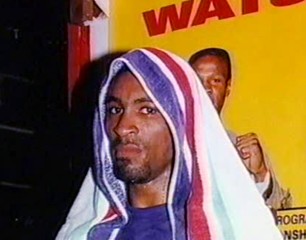 By Ted Sares:
By Ted Sares:
To be honest, a few months before I started training for the marathon, I could hardly walk across my bedroom without falling over.
–Michael Watson
He was an inspiration to me throughout it, as he has been to all those who have met him. He is a noble man who, unbowed by a burden which even now would extinguish most of us, took his long walk not for himself but for others less fortunate.
–Peter Hamlyn
I was completely inspired. I felt tears falling from my eyes. It has lived with me forever. How do you expect that to make a man feel when you are called ‘The People’s Champion?’ That’s the one label they will never take away from me.
–Watson
Getting angry won’t correct the past.
–Watson
If you sit there and watch a person take about an hour to tie his shoestrings, then you realize that whatever problems you got ain’t that significant.
—Vernon Forrest 2006
Chris “Simply the Best” Eubank (45-5-2) fought from 1986 to 1998; Carl “The Cat” Thompson (34-6) duked from 1986 until 2005; Nigel “Dark Destroyer” Benn (42-5-1) did his fearsome work from 1987 to 1996; Michael Watson (25-4-1) toiled from 1984 until 1991. There were many others, but these four traveled on a uniquely fast and furious pathway. For me, one has always stood out, but not for his boxing achievements–which were considerable—but for something else.
Watson
On April 19, 2003, Michael Watson completed the Flora London Marathon, walking two hours each morning and afternoon for six days as he raised money for the Brain and Spine Foundation, He slept overnight in a support bus that followed him. Finishing the race by his side were Chris Eubank and Peter Hamlyn, his neurosurgeon consultant, both of whom had become his personal friends. Few who witnessed this emotion-packed moment did not have watery eyes and chills down their spine. It was the culmination of a long fight back after having almost lost his life in the ring against Chris Eubank on September 21, 1991 in what has been called one of the most savage fights in British boxing history. Hell, it was Britain’s version of Hagler-Hearns.
Both had agility, skill and power and were classy and smart fighters who could adapt for different circumstances and find different ways to win. After a grueling ten rounds of action, things came to a boil in round 11. It was an incredible and classic ebb and flow three minutes with Eubank tiring badly, but then suddenly rallying and taking it to Watson, hurting him with several hard shots. But this rally almost gassed him, allowing Watson to return the punishment in kind and finally knocking Eubank down with a clubbing right to the head. Then, with Watson ahead on points and seemingly on the verge of a stoppage victory, Eubank got up and immediately connected with a devastating right uppercut which caused Watson to fall back and hit the back of his head against the ropes. His eyes glazed over as the bell rang and he staggered back to his corner. Soon after round 12 began, a helpless Watson was trapped in a corner and Referee Roy Francis wisely stopped the fight after which the London native collapsed in the ring.
There was no ambulance or paramedic (s) at the scene. Several minutes went by. Doctors reportedly wearing dinner jackets then arrived, but Michael received no oxygen. A total of 28 minutes elapsed before he received treatment in a hospital. He spent over a month in a coma and had six brain operations to remove a blood clot. He then spent over a year in intensive care and rehabilitation and six more grueling years in a wheelchair while he ever-so-gradually recovered some movements and regained ability to speak and write.
Truth be told, no one really expected him to live, much less talk or write. Yet, against all odds, he finished the Marathon in 2003, capturing the hearts and minds of an entire nation. As people wept in joy and urged him on, he walked six days. He reached his goal after twelve long years, too many operations and hospitals, and years in a wheelchair. But he trained for months and completed his goal of 26 miles ad 385 yards.
Now I could write about the law suits that followed, or about his boxing exploits which were considerable. His record was an admirable 25-4-1, and his stoppages over Nigel Benn and Errol Christie were fine achievements. So was his first fight against Eubank in which he lost a highly controversial majority decision by scores of 116–113, 115–113 and 114–114.
But this is not about his boxing record and God knows it’s not about the law suits that followed and were won by Michael. No, this is about his incredible fighting heart; this is about what inspiration is all about. And that’s all anyone really needs to know about a very special man named Watson.
Postscript: On 4 February 2004, Michael was awarded the MBE (Most Excellent Order of the British Empire) by H.M. Queen Elizabeth II.
Hamlyn established the Brain and Spine Foundation seventeen years ago, and remains in awe of Watson.